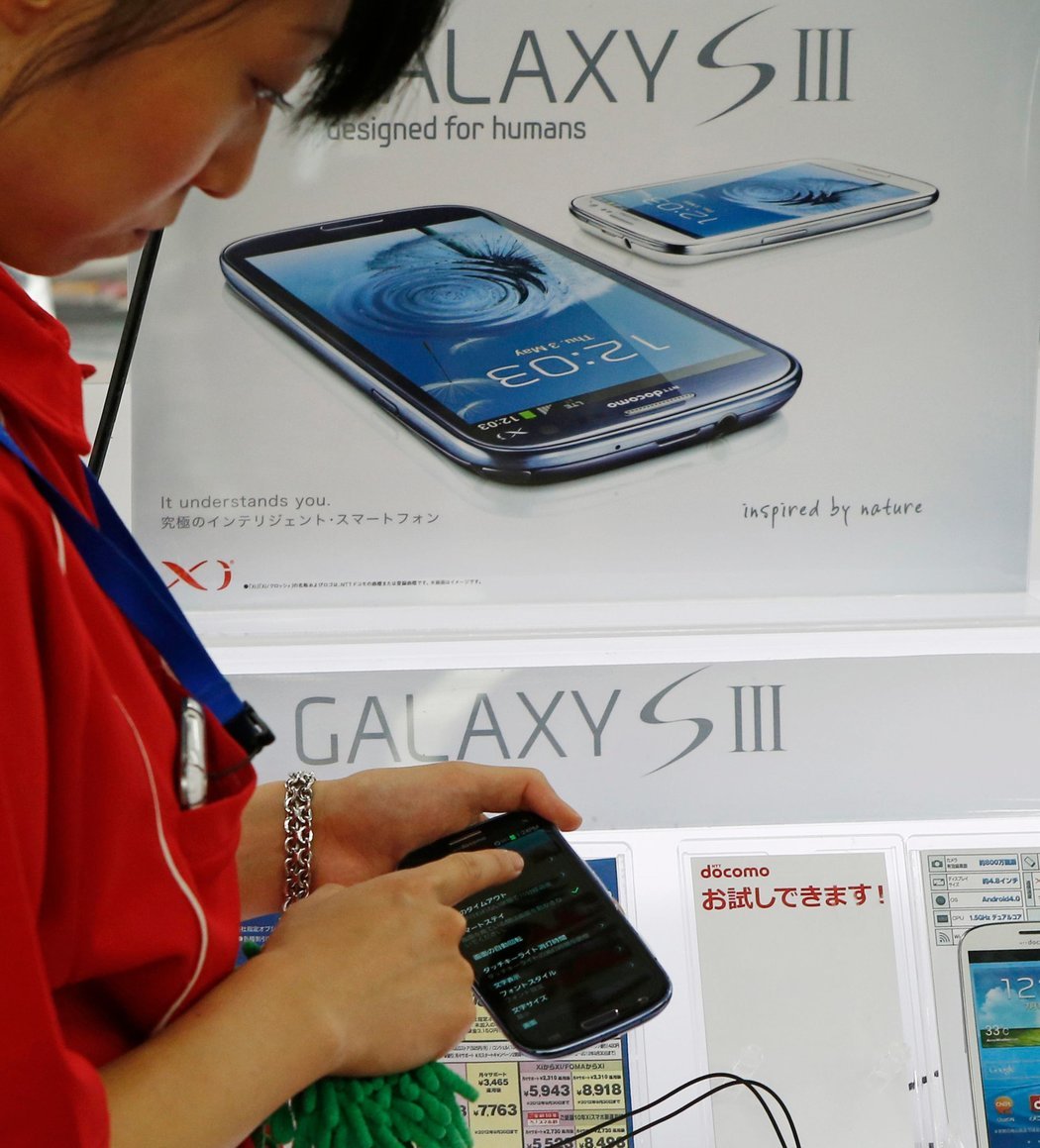|
TOKYO — Brandishing a new Sony Xperia as she left a mobile phone shop in a trendy part of Tokyo, Nisako Hanawa, a 17-year-old student, explained that she had chosen that brand “because of its cool design and its good reputation.”
东京——在东京的一个时尚街区,17岁的学生花轮丹佐子(Nisako Hanawa,音译)拿着一部索尼Xperia新手机走出手机店。她说自己选择了这个品牌是“因为它有炫酷的设计和良好的信誉”。
Asked about another leading smartphone maker, Samsung Electronics of South Korea, she and a friend exchanged quizzical looks. “Samsung?” Miss Hanawa asked. “I haven’t heard of it.”
当被问及另一家领先的智能手机制造商韩国三星电子(Samsung Electronics)时,她和朋友疑惑地看了看对方。“三星?”她问,“我从来没有听说过。”

一些日本人从来没有听说过三星公司。
Samsung Electronics may be the largest consumer electronics company in the world, selling one out of every three smartphones and one in five televisions. LG, the other giant electronics maker in Korea, has a significant share of TV and washing machine markets in Europe and the United States. But here in trend-obsessed Japan, consumers have not caught on that elsewhere in the world some Korean products are knocking Japanese rivals off the shelves.
三星也许是全球最大的消费类电子产品公司,全球每售出三部智能手机,就有一部产自三星,每售出的五台电视机中,也有一台是三星的。另一家韩国电子产品巨头LG在欧洲和美国的电视和洗衣机市场上也占有可观的份额。但是,在热衷于潮流趋势的日本,消费者们还没有发现,某些韩国产品正在世界上的其他地方把同类日系产品赶下货架。
Many Japanese explain away the absence of Korean brands by claiming the quality is inferior. “South Korean products are still affected by a ‘cheap and nasty’ image, which remains prevalent among Japanese above a certain age,” wrote Hidehiko Mukoyama, an economist at the Japan Research Institute, in a research paper about Japan-South Korea trade relations.
很多日本人认为,韩国品牌在日本缺少知名度的原因是其质量不佳。“韩国产品‘便宜而糟糕’的形象挥之不去,在某个年龄阶段以上的日本人中,这种看法仍然盛行。”日本综合研究所(Japan Research Institute)的经济学家向山英彦在一篇关于日韩经贸关系的研究论文中写道。
The evidence says otherwise. Korean-made TVs, phones, washers and cars rate higher than many Japanese brands in independent tests by Consumer Reports, CNet and others. LG TVs have been getting favorable reviews in Japan. A local magazine, HiVi, recently rated a 32-inch, high-definition, 3-D-capable LG set-top ahead of televisions in its category from Mitsubishi and Sharp.
但有证据显示,事实并非如此。在为消费报告进行的独立测试里,韩国电视机、手机、洗衣机和汽车获得的评分优于很多日系品牌。LG电视机正在日本获得好评。日本杂志《HiVi》给带3D功能的32英寸高清LG电视机打出最高评分,高于来自三菱(Mitsubishi)和夏普(Sharp)的同类电视产品。
The unfamiliarity is not because tariffs make Korean products costlier. Japan eliminated the import duty on many Korean electronics products, including TVs and smartphones.
日本人不熟悉韩国产品,并不是因为加上关税之后,这些产品的价格变得比较昂贵。日本已经取消了针对电视机和智能手机等很多韩国电子产品的进口关税。
But this last holdout is finally being cracked open. In 2008, LG stopped selling its televisions in Japan, but it reintroduced them two years later. Now many of the biggest electronics retailers in Japan, including the No. 1 player, Yamada Denki, and the second-biggest chain, Biccamera, sell LG TVs.
但是,日本人对韩国产品最后的一层抗拒感也终于开始瓦解。2008年,LG停止在日本发售电视机,但两年后又卷土重来,再次进军日本。如今,日本很多大型电子产品零售店里都有LG电视机出售,其中包括排名第一的山田电机(Yamada Denki)和第二大的电器连锁店Biccamera。
At a suburban Tokyo branch of Nojima, a major Japanese retail chain, LG televisions are displayed prominently alongside sets from domestic brands like Sony, Sharp, Panasonic and Toshiba.
在日本大型零售连锁店野岛电器(Nojima)位于东京郊区的一家分店里,LG电视机和索尼、夏普、松下和东芝等日本国产名牌电视机一起,被摆放在显眼的位置上。
Kohei Tomizawa, a sales clerk, said LG TVs were selling briskly, though not as well as those from Sony. LG sets “tend to be more popular with younger people, and younger people don’t buy as many televisions as older customers, who tend to prefer well-known Japanese brands, like Sony,” Mr. Tomizawa said.
售货员富泽耕平(Kohei Tomizawa,音译)说LG电视机很畅销,但索尼电视机的销售势头更好。LG“往往更受年轻人的青睐,但年轻人的购买量比不上年龄比较大的顾客,而后者更愿意购买索尼这样的知名日本名牌。”富泽耕平说。
The quality myth may be less believable to a younger generation of consumers. With South Korean food and television shows popular in Japan, LG has latched on to the popularity of K-pop music across Asia and beyond. It has run ads for its smartphones in Japan that feature Kara, a Korean group that is popular in Japan.
年轻一代的消费者可能不太相信韩国产品质量不佳的说法。随着韩国食品和电视节目在日本流行起来,LG开始利用韩国流行音乐在亚洲和其他地区的旺盛人气。它在日本投放的智能手机广告由韩国组合Kara代言,这个组合在日本很受欢迎。
“I think things have improved compared to the old days, thanks to the influence of Korean popular culture,” said Byoung-Uk Lee, assistant director of the Korea Trade-Investment Promotion Agency in Japan.
大韩贸易投资振兴公社(Korea Trade-Investment Promotion Agency)日本代表处助理处长李秉煜(Byoung-Uk Lee,音译)说,“受韩国流行文化的影响,情况比过去好一些。”
LG said it sold about $675 million worth of TVs, smartphones, washing machines, vacuum cleaners and other goods in Japan last year, up about 45 percent from 2010.
LG称,该公司去年在日本出售了价值6.75亿美元(约合41.32亿元人民币)的电视、洗衣机、真空吸尘器及其他商品,销售总额比2010年上涨大约45%。
Samsung also pulled out of Japan in 2007, after failing to make much of a dent here. (The biggest Korean carmaker, Hyundai Motor, also beat a retreat from Japan shortly thereafter.)
由于没能在日本有所斩获,三星于2007年退出日本市场。(不久之后,韩国最大的汽车制造商现代汽车[Hyundai Motor]也放弃了日本市场。)
But Samsung has come back for a second shot in Japan, starting with its smartphones. NTT Docomo, the largest mobile phone carrier in Japan, has turned to Samsung to try to fend off rising competition from two rival network operators, SoftBank and KDDI.
但三星开始通过其智能手机重返日本市场。日本头号移动电话运营商都科摩公司(NTT DoCoMo)已经与三星展开合作,以抵御来自竞争对手软银(SoftBank)和KDDI的日益激烈的竞争。
Those two companies have been poaching customers from Docomo, which does not offer the popular iPhone. “Docomo needs Samsung, and that is giving it an opening,” said Michito Kimura, an analyst at IDC, a research firm.
由于都科摩公司并不销售广受欢迎的iPhone,这两家公司一直在抢夺都科摩公司的顾客。研究公司国际数据公司(IDC)分析师木村道人(Michito Kimura,音译)说,“都科摩需要三星,这给了三星一个机会。”
Starting in May, Docomo plastered Japanese cities with advertising posters featuring the flagship Samsung Galaxy S4 smartphone alongside a Sony Xperia A. The campaign, for what Docomo bills as its “summer collection,” is the first time that any Japanese carrier has given such prominence to a Samsung phone.
从今年5月开始,都科摩在日本各大城市张贴广告海报,海报中,三星旗舰级智能手机Galaxy S4 与索尼XPeria A并排而列。都科摩称此次活动里的手机是他们的“夏季系列”,这是日本运营商首次如此大力度地推广三星手机。
So far, the results of Docomo’s embrace of Samsung have been mixed. Analysts say Samsung smartphones have been a tougher sell in Japan than in other countries where consumers are familiar with the brand through the televisions and other goods.
到目前为止,都科摩针对三星手机的推广活动让人喜忧参半。分析人士称,与其他国家相比,在日本销售三星智能手机比较难,其他国家的消费者通过电视及其他产品早已熟知这个品牌。
Docomo said that under its summer promotion, it had sold 400,000 Galaxy S4 phones through mid-July, but that was less than half the total of Sony Xperia A handsets.
都科摩称,到7月中旬,该公司在夏季促销活动中售出了40万部Galaxy S4手机,但这个数量不足索尼Xperia A手机销售量的一半。
Apple dominates the Japanese smartphone business, holding a 40 percent market share in the first quarter, according to IDC. Sharp, with 15 percent, and Sony, with 13 percent, follow. Samsung has not cracked the top five vendor ranks.
据IDC透露,苹果(Apple)在日本智能手机市场中占据主导地位,第一季度的市场份额为40%。夏普(Sharp)占据15%的份额,索尼位居第三,份额为13%。而三星尚未进入五大销售品牌。
Japanese and Korean news media have reported that Samsung is considering re-entering the Japanese television market. Samsung declined to comment.
日本和韩国的新闻媒体曾报道称,三星正在考虑重返日本电视市场。三星拒绝就此置评。
To succeed in Japan, Samsung will have a lot of work to do changing a mind-set. But some analysts, like Sea-Jin Chang, the author of “Sony vs. Samsung: The Inside Story of the Electronics Giants’ Battle for Global Supremacy,” are convinced that South Korean companies have a brighter future in Japan.
为了在日本取得成功,三星需要做很多工作,以改变思维定式。但一些分析人士确信,韩国公司在日本拥有较为光明的未来,比如《当索尼遇到三星:如何超越VS如何反超越》(Sony vs. Samsung: The Inside Story of the Electronics Giants’ Battle for Global Supremacy)一书的作者张世真(Sea-Jin Chang)。
“Japanese customers favor domestic producers,” said Mr. Chang, executive director of the Center for Governance, Institutions and Organization at National University of Singapore. “No Korean or Western firms were good enough for them, except Apple. But you will find more Korean firms accepted in the Japanese mainstream in the future.”
“日本消费者青睐国内生产商,”新加坡国立大学(National University of Singapore)管理、机构及组织中心(Center for Governance, Institutions and Organization)执行主任张世真说。“对于他们来说,除了苹果之外,韩国和西方的公司都不够好。但你会发现,未来会有更多韩国公司被日本主流消费者接受。”
翻译:土土、许欣
|
- VOA 英语教学节目
-
- 经典英语在线训练资源
-
|

